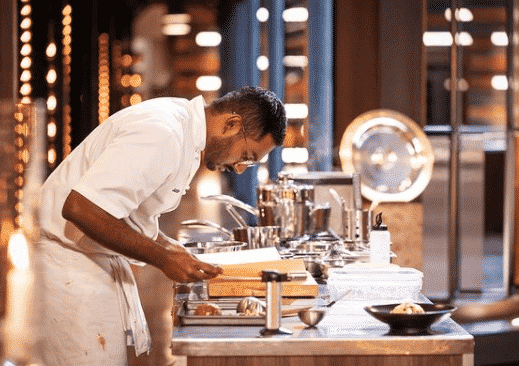The pressure was palpable as Justin Narayan took on Pete Campbell and Kishwar Chowdhury in the season finale of MasterChef Australia.
The cook was impossibly complex, and we saw shaky fingers, unset custards, tumbles on the kitchen floor… and judges cringing and looking away, even covering their faces.
Justin himself could not seem to get started, struggling to remove the membrane off his squid as his competitors gained the edge over him.
“It was so extremely frustrating,” Justin recalled as he spoke with Indian Link. “There was a limited amount of time, and a limited amount of fish, and I thought if I keep doing what I’m doing I’ll just disintegrate the fish and there’ll be nothing left.”
Spiralling in a negative direction, he decided to stop, take a breath and compose himself.
“And then I heard Dad call out to me from the gantry and say, cheers. Somehow after that, I relaxed and things flowed better.”
The membranes smoothed off neatly, the pearly whites flashed again, and there was no looking back after that.

Justin transformed into ‘Mr Calm’. With not a hint of anxiety, he became almost Gandhian in his peaceful focus. So much so that his dad called out to say, “This is not Fiji time”, and the judges at the final plating wondered if he would finish on time.
And yet they tasted in silent awe as he presented his version of celebrity chef Peter Gilmore’s dishes (Shaved squid with shiitake custard, koji butter and pinstripe peanuts, and the dessert created for this challenge, the Golden Crackle). As they mumbled their admiration, viewers knew Justin would walk away with the title – and the $250,000 prize money.
His mindfulness – even as others around him stressed for him – appears to be a strength of character, and no doubt the reason for his ‘Captain Consistency’ epithet.
“I just wanted to enjoy every moment of that last cook, to do it well and not rush it,” Justin revealed with characteristic simplicity.
Will he ever cook those intricate Peter Gilmore dishes again?
“I’m still recovering from the trauma,” he laughed, and then added, “But if I have a spare 5 ½ hours, and all the equipment, I might think about it!”
READ ALSO: Social media reacts to the MasterChef 13 finale
View this post on Instagram
There are two other dishes though that the 28-year-old Perth lad will probably cook a few times. “Two of my stand-out dishes, if I had to pick, would be Poached Lobster with Tarragon and Poached Fish with Curry Broth.”
The lobster came from the cook for Melbourne’s new restaurant Society. “I’ve never touched so much money in my life,” he said famously on the show, as he cooked that lobster for 24 diners.
Judge Melissa Leong described it as “a tightrope of perfection.”
The fish dish came from the Indigenous ingredients episode, and saw Justin use karkalla, Geraldton wax, cinnamon myrtle and lemon myrtle leaves.
“It was a fun concept,” Justin recalled. “It was cool to show fusion between Indian and Indigenous ingredients, and also the fusion of what I knew before and what I learnt while on the show.”
Despite these hugely successful cooks, it is not surprising to learn what Justin picks as his most exhilarating moment of the show: “When the families ran into the kitchen.”
It’s a sentiment that sits well with his affable and grounded personality.
It is quite obvious that his Fiji-Indian family remains front and centre of his life, as he talks about his dad’s recent illness, mum’s cooking, and his fiancée Esther.
There’s no doubt also that the MasterChef experience will be one that he will cherish for the rest of his life.
“It’s a huge honour to be a part of something that has contributed so significantly towards modern Australian cuisine. The show has changed the very concept of Australian food. You name a cuisine and it’s been there. This season alone it has showcased Bangladeshi, Sri Lankan, Indian, Cambodian, Korean, food. It has made people aware of and accept new cuisines, and have an appetite for food different from their own.”
READ ALSO: MasterChef Australia’s Depinder: From pharmacy to food
View this post on Instagram
Equally, he added, it has done wonders for social inclusivity.
“Food is a great equaliser. You eat delicious food, you can’t deny it. When you see and taste the food from various cultures, when you relish someone else’s food, you learn to accept their culture a little bit more. I think through food, MasterChef has done a lot to increase our awareness about other cultures.”
As a person of colour who won the title, Justin is keen to encourage others like him to try MasterChef. “Regardless of your culture or skin colour, on MasterChef, they’re judging food. Give it a crack, I’d say. Cook the food you grew up with, cook the food you find delicious.”
Future plans include all the expected from a MasterChef winner – book, food shows, restaurant. But not surprisingly for someone who has worked as a youth pastor, social justice is always on the mind. Justin has his eyes set on Vision Rescue, a not-for-profit that works with kids in the slums of Mumbai.
READ ALSO: MasterChef 2021 has made Australia that little bit more inclusive
Link up with us!
Indian Link News website: Save our website as a bookmark
Indian Link E-Newsletter: Subscribe to our weekly e-newsletter
Indian Link Newspaper: Click here to read our e-paper
Indian Link app: Download our app from Apple’s App Store or Google Play and subscribe to the alerts
Facebook: facebook.com/IndianLinkAustralia
Twitter: @indian_link
Instagram: @indianlink
LinkedIn: linkedin.com/IndianLinkMediaGroup





